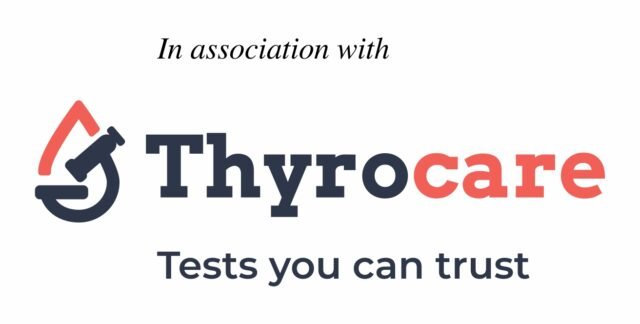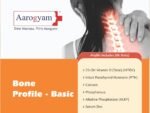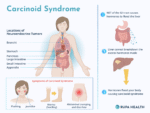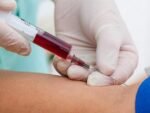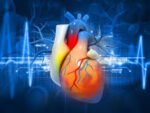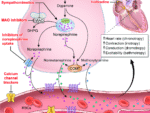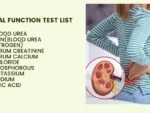Showing 19–27 of 141 results
-
2%
BONE PROFILE – BASIC
A bone profile blood test assesses bone health by measuring levels of key minerals, proteins, and enzymes in the blood, providing insights into bone turnover, mineral balance, and overall skeletal health.Here’s a more detailed explanation:What a Bone Profile Measures:-
-
Calcium:Essential for bone health, nerve function, and muscle contraction.
-
Phosphate:Works with calcium to maintain bone health and is crucial for energy production and cell function.
-
-
Alkaline Phosphatase (ALP):An enzyme produced by osteoblasts during bone formation; elevated levels can indicate increased bone turnover or bone growth.
-
Albumin:A protein created in the liver, low levels are associated with lower bone density.
-
Other markers:Depending on the specific test, a bone profile may also include markers like osteocalcin (a protein produced by osteoblasts during bone formation).
Why Bone Profile Tests are Important:-
Diagnosis:Bone profile tests can help diagnose and monitor conditions like osteoporosis, Paget’s disease of the bone, and other bone disorders.
-
Monitoring Bone Health:They can track bone turnover and mineral balance, helping healthcare professionals assess the overall health of the skeleton.
-
Evaluating Metabolic Processes:The test helps determine how well the body’s metabolic processes are affecting the skeleton.
-
Assessing Bone Density:A bone density scan (DEXA scan) is often used alongside a bone profile to assess bone strength and density.
When a Bone Profile Test Might Be Recommended:-
Osteoporosis Risk Factors:Individuals with a family history of osteoporosis, those who have experienced fractures, or those who are at risk due to age or other factors may be recommended for a bone profile.
-
Suspected Bone Disorders:If someone has symptoms or signs of bone problems, such as pain, fractures, or changes in bone density, a bone profile might be ordered.
-
Monitoring Treatment:Bone profile tests can be used to monitor the effectiveness of treatments for bone disorders.
-
Other Conditions:Bone profile tests can also be used to assess conditions that affect bone health, such as kidney problems, liver disease, or hormone imbalances.
₹2,250.00Original price was: ₹2,250.00.₹2,200.00Current price is: ₹2,200.00. -
-
2%
₹10,000.00Original price was: ₹10,000.00.₹9,800.00Current price is: ₹9,800.00. -
1%
CARDIAC PROFILE – BASIC
Heart failure (HF) has been recognized as a common complication of diabetes, with a prevalence of up to 22% in individuals with diabetes and increasing incidence rates. Detection of people at high risk for HF (stage A) or those with stage B HF (without symptoms but with either structural/ functional cardiac abnormalities or elevated biomarkers natriuretic peptides or troponin) would permit earlier implementation of effective strategies to prevent or delay the progression to advanced HF in individuals with diabetes
₹3,050.00Original price was: ₹3,050.00.₹3,000.00Current price is: ₹3,000.00. -
4%
₹1,250.00Original price was: ₹1,250.00.₹1,200.00Current price is: ₹1,200.00. -
3%
CARDIAC RISK MARKERS – ADVANCED
Indians are at very high risk of developing Atherosclerotic Cardiovascular disease (ASCVD), they usually get the disease at an early age, have a more severe form of the disease and have poorer outcome as compared to the western populations. This is due to high prevalence of Atherogenic dyslipidemia, central abdominal adiposity & increased transfats in our diet. Among the various risk factors for ASCVD such as dyslipidemia, Diabetes mellitus, sedentary lifestyle, Hypertension, smoking, genetic predisposition etc., dyslipidemia has the highest population attributable risk for MI. Hence monitoring lipid profile regularly for effective management of dyslipidemia remains one of the most important healthcare targets for prevention of ASCVD. This monitoring should start as early as 20 years of age. Lipid association of India (LAI 2020) has categorized individuals into Low risk, Moderate risk, High risk, Very high risk & Extreme risk on the basis of their LDL-C, Non-HDL-C & ApoB blood levels. Use of lipid lowering drugs particularly statins has reduced ASCVD morbidity and mortality; however significant residual risk for the events remains. Additional testing for inflammatory (HsCRP), non-lipid (Homocysteine) and other lipid biomarkers (Apo A, Apo B & Lp(a) ) may be considered for risk refinement. Presence of one or more secondary risk factor should prompt the clinician to consider drug therapy for patient whose atherogenic cholesterol level is higher than goal level.
₹1,550.00Original price was: ₹1,550.00.₹1,500.00Current price is: ₹1,500.00. -
15%
CARDIOMETABOLIC SYNDROME PANEL
Cardiometabolic syndrome represent a cluster of interrelated risk factors, primarily hypertension, elevated fasting blood sugar, dyslipidemia, abdominal obesity and elevated triglycerides. Cardiometabolic health has emerged as a concern due to increasing trend in development of Obesity and Metabolic syndrome which are independent risk factors for Cardiovascular Diseases and other complications. The two most important risk factors defined by National Heart, Lung and Blood Institute are Central obesity and Insulin resistance. Other risk factors include age, family history, lack of exercise and Polycystic Ovarian Syndrome. Metabolic syndrome increases the risk of development of Type 2 Diabetes Mellitus, Cardiovascular complications like Atherosclerosis, Peripheral Vascular Disease, Heart attack, Stroke as well as Non Alcoholic Fatty Liver Disease (NAFLD). The syndrome is typically asymptomatic thus it is recommended to measure additional biomarkers associated with insulin resistance.
₹3,200.00Original price was: ₹3,200.00.₹2,700.00Current price is: ₹2,700.00. -
2%
CATECHOLAMINES, PLASMA
Catecholamines are a group of hormones that are released in response to stress. They are produced by the adrenal glands and nerve tissue, including the brain.Types of catecholamines dopamine, epinephrine (adrenaline), and norepinephrine (noradrenaline).How they work-
- Catecholamines enter the bloodstream and trigger the body’s “fight or flight” response
- This response increases blood flow to the brain and muscles, increases heart rate and blood pressure, and increases alertness
- The body eliminates the remaining waste through urine
Abnormal catecholamine levels- High levels of catecholamines can cause high blood pressure, headaches, sweating, rapid heart rate, and anxiety
- Low or high levels of catecholamines can indicate an underlying health issue, such as a tumor
Catecholamine tests- A urine or blood test can measure the amount of catecholamines in the body
- These tests can help check for certain tumors
₹8,000.00Original price was: ₹8,000.00.₹7,800.00Current price is: ₹7,800.00. -
-
11%
CHLAMYDIA TRACHOMATIS PCR
The Chlamydia Trachomatis PCR test is a rapid and sensitive method to detect Chlamydia trachomatis bacteria in a sample, usually a swab from the genital area or urine. This test amplifies and detects the bacteria’s DNA, making it a highly accurate diagnostic tool.
Here’s a more detailed explanation:
What it detects:
The PCR test identifies the presence of Chlamydia trachomatis by amplifying specific DNA sequences of the bacteria.
How it’s done:
A sample, like a swab from the genital area or a urine sample, is taken and processed to extract the DNA. Then, a PCR reaction amplifies a specific DNA region of the Chlamydia bacteria.
Why it’s used:
This test is used when someone has symptoms of chlamydia, such as unusual discharge or pain during urination, or as part of routine STI screening.₹4,500.00Original price was: ₹4,500.00.₹4,000.00Current price is: ₹4,000.00. -
14%
₹3,500.00Original price was: ₹3,500.00.₹3,000.00Current price is: ₹3,000.00.

